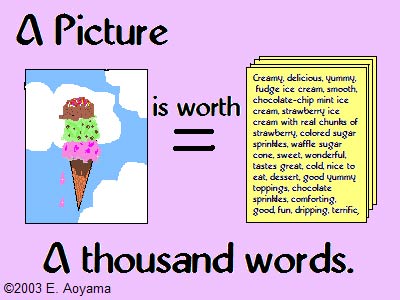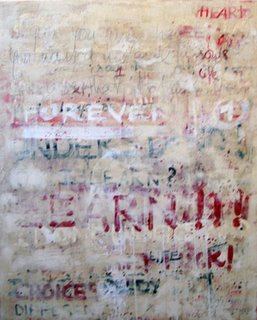
If it is true that a
This picture is entitled: “and the words got in the way”!

Remove the words and what is communicated?
A work of Tenniel that is definitely diminshed by the addition of ‘explanatory’ words. (Click on image to enlarge)

When confronted with such gobbledegook I am reminded of Hamlet's speech:
Lord Polonius: What do you read, my lord?
Hamlet: Words, words, words.
Lord Polonius: What is the matter, my lord?
Hamlet: Between who?
Lord Polonius: I mean, the matter that you read, my lord.
(Hamlet II, ii.)
But even the simple clarity of Shakespeare’s verse can be mangled by commentators;
“By doing this Hamlet "[...] breaks the social contract necessary to ordinary human discourse, the contract which mandates that there be, in Roman Jakobson's words, `a certain equivalence between the symbols used by the addressor and those known and interpreted by the addressee' " (Ferguson 249).
It's a pun that Hamlet uses, to wrong foot Polonius.
How often are words used to impress the reader to give the impression, albeit spurious, that the writer has some intellectual superiority?
A fireman I knew who worked at the New London Theatre used to quote: "Taurus excreta cerebrum vincit" (Bullshit baffles brains) and that applies all too often!
Here is a fun web-site that has a generator of such phrases, from management.
The link between knowing something and language, it has been suggested, comes down having the words to express the idea. No language, no concept ~ that’s the theory!
This leaves out intuitive understanding which, by definition, requires no vocabulary.
However, I wouldn’t go as far as this writer
“. . . there may be some things we will never know the course of. [That’s no reason to think they didn’t happen, though, even if we don’t know them. Reality is not constrained by what we can know.]”
Really? I guess that communicating knowledge to others though, still relies upon the use of words, or pictures, or indeed, word pictures.
This post was inspired by reading a randomly found blog by Jane McGongal who in the writing of her thesis between March and July this year posted her The Best Sentence of the Day. Yes, 97 inpenetrable sentences which have elicited enthusiastic comments from others who are impressed with convoluted analysis of ‘Game theory’. It's an intellectual game in itself trying to identify the meaning! I think though, the writer was aware of the ridiculous nature of many of her own quoted sentences ~ hence the blog.
Where has educaton gone wrong when it can start with the teaching of reading and writing and end up with a ‘learned’ thesis that, whilst it impresses those with an inside track to the jargon used, does nothing in furthering communication nor adding to the sum of knowledge that can be accessed by all the others who have also been taught to read and write?
2 comments:
A teasingly intriguing blog... And how apt that you should select John Tenniel's illustration of the Fish and Frog Footmen with its utterly absurdist commentary, since the illustration itself depicts a scene of convoluted communication:
'The Fish-Footman began by producing from under his arm a great letter, nearly as large as himself, and this he handed over over to the other saying in a solemn tone, "For the Duchess. An invitation from the Queen to play croquet."
'The Frog-Footman repeated, in the same solemn tone, only changing the order of the words a little. "From the Queen. An invitation for the Duchess to play croquet."'
We can probably safely leave it to the logicians to tell us whether both descriptions actually describe the SAME letter... :-)
Hi David,
If you're referring to my dissertation in the last passage, you might be interested to learn that is chapters in their full form (not excerpted single sentences) has been read, and judging from the really interesting feedback I've received quite well understood, not only by many on what you consider the "inside track" of either academia and game development-- but also, quite a large number of players and other folks interested in what happens when ubiquitous computing meets game design. The blog sentences are hard to understand because they are completely out of context-- no terms have been defined, no references provided, no examples, no clear antecedents--but in context, I think you would find it quite clear and accessible to non-academics. That's something I strive for and indeed would say I am well known for in previous published work. You've defined an interesting probably, but I would hardly say that my writing contributes nothing to the general reading and writing public. I probably shouldn't bother trying to defend my work here, because you were only mildly critical and I think tried to take my perspective as a blogger into consideration. But I would encourage you to actually read some of my published work before reaching that conclusion. www.avantgame.com/writings.htm. The most popular article is "This Is Not a Game". Cheers.
Post a Comment